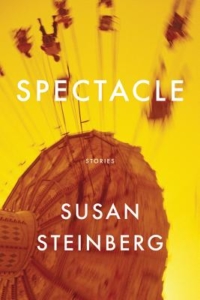The back cover of Susan Steinberg’s new story collection Spectacle claims that “in these stories, wounded women stand at the edge of disaster and risk it all to speak their darkest secrets.” If they’re taking risks, the narrator doesn’t seem to care, and as a result, neither does the reader.
The book’s characters, who in retrospect often seem to blend together, spend most of their time in a boring tailspin of liquor, drugs, and unfulfilling sex. Take the opening of the story “Supernova.”
When the plane crashed, I was all messed up. I was all kinds of
all messed up. Because first we’d had drinks. Next we’d smoked.
There were pills we’d taken from a bowl on the floor. The pills
all did their different things. We liked not knowing what they
would do. It didn’t matter which way we went.
Because of all this retreat into image and id, the characters usually end up going nowhere at all. For the most part, very little happens in these stories, in a narrative sense. They’re almost closer to being prose poems, though without the usual sense of introspection. In her best moments, Steinberg has a good command of rhythm and flow. She can cadence. And, over the course of the book, she develops an identifiable voice. Unfortunately, that authorial voice is disaffected and shallow, and the stories that emerge therefrom are self-indulgent, vague, and ultimately rewardless for the reader.
Partly, what’s so frustrating about this narrator is its complete adolescent disaffection. As a reader I, at least, typically expect authors to at least care about what they’re communicating, but Steinberg’s apathy runs deep. She claims that we are beyond meaning, presumably as a species or as a culture. She writes, of a difficult phone call,
The metaphor is unintentional.
I mean of disconnection.
There is no intentional metaphor in this story.
There is no intentional meaning in this story.
I would not subject you to intentional meaning.
I would not subject you to some grand scheme.
But this “grand scheme” is what Spectacle is missing. Without the sense that the characters are living in a world that matters — in which there are consequences, futures, pasts — why should the stories themselves matter to their readers? They may matter to Steinberg herself, but that’s not sufficient rationale to publish. As the drug abuse might suggest, her characters actively hold themselves back from human connection, from making meaning, and retreat into their skulls.
You might think that for a narrator so fixated on sex and sexual possession, getting off would at least be desirable, but the book’s apathy is so totalizing that even that’s impossible:
I wish I could give you a climactic moment. But there is no
climactic moment in this. There is no such thing here as climactic.
In a story about a hike, there is only a circling around and around.
In a story about me and guys, there is only a circling around.
And in a story about a story.
These ambiguous “guys” are a fixture in these stories. They’re crucial to taking part in the cycle of sexual possession that matters so much to Spectacle. But they also don’t really exist to their girls; they have blurry faces and never names, they stay at the periphery.
They were students like us.
They lived in small apartments like us.
They took useless classes like us.
We took philosophy because they took it too.
Though we didn’t understand philosophy.
We passed notes in class on how bored we were.
The worst part of the narrator’s relationship to men is that it’s self-aware, acknowledged but not questioned. The girls try to pretend that they have agency, that they electively self-objectify and so are liberated. But in the end, they are unable to separate their selfhoods from their need to be wanted.
He said, I can carry your bag.
There are too many guys in this story.
For a story about a girl, that is.
For a story about being a girl, that is.
At the end of the collection’s best story, “Cowboys,” Steinberg makes an attempt to infuse her theme of stagnation with the comfort of the infinite:
There was a sky turning light. The same sky as everywhere
turning light.
Call it what you will, but there I was, same as you were,
under that sky.
There I was, just some poor soul. Same as you.
That’s a nice meaning, frankly, and a glimpse of a coming-together in the midst of so much coming apart. It would be nice if that’s what stuck with me after reading Spectacle, and not the endless frustration of trying to care about sentences and characters that are not properly cared for by their author. Once again, the book itself says it best:
It doesn’t matter.
All that matters is that it was night.
And it was cold.
It was night.
And it was cold.
It was night.
And it was cold.
Just stop.
This post may contain affiliate links.









